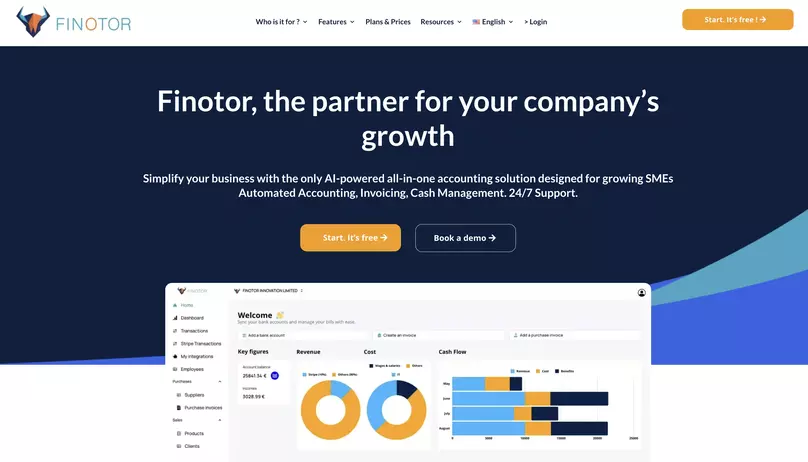Contents
Introduction to UK VAT: The Basics
Value Added Tax (VAT) is a critical concept for businesses and consumers within the United Kingdom, affecting pricing, compliance, and financial management. Understanding the nuances of UK VAT is essential for any company looking to maintain compliance and optimize their financial strategies. In this comprehensive guide, we delve into the basics of VAT, its importance, and the registration process to ensure that your business is knowledgeable and prepared.
What is VAT and How Does it Work?
VAT is a consumption tax placed on a product whenever value is added, from production to the point of sale. The amount of VAT that the user pays is on the cost of the product, less any of the costs of materials used in the product that have already been taxed. Understanding VAT’s mechanism is crucial for businesses, especially for companies like Finotor, which offers a one-stop solution for managing company finances and can help automate these tax processes.
The Importance of VAT for Businesses and Consumers
VAT represents a significant source of revenue for the UK government and has widespread implications for both businesses and consumers. For businesses, it is a factor in determining the pricing of goods and services, while for consumers, it affects the cost of purchases. Effective VAT management can be the difference between success and failure in business, making services like Finotor an invaluable ally in managing these complexities.
Understanding the VAT Registration Process
When a business’s taxable turnover exceeds the VAT threshold, it is required to register for VAT with HM Revenue & Customs (HMRC). The registration process involves several steps and providing specific details about your business. Once registered, businesses must charge VAT on their products or services, submit VAT returns, and may be eligible to reclaim any VAT they’ve paid on business-related goods or services. Comprehending the VAT registration is fundamental for compliance and can be streamlined by utilizing Finotor’s financial management solutions.
Standard, Reduced, and Zero VAT Rates
The UK VAT system categorizes goods and services into different rates: standard, reduced, and zero. It’s imperative for businesses to correctly classify their offerings in these categories to ensure accurate VAT charging and reclaiming.
Identifying Goods and Services at Standard 20% VAT
The majority of goods and services fall under the standard VAT rate of 20%. This encompasses a wide array of products from electronics to utility services. Businesses must apply this rate unless the goods or services are categorized differently by HMRC. Misclassification can lead to financial penalties, highlighting the need for efficient accounting systems like those provided by Finotor.
Exploring the Reduced Rate of 5% and Eligible Items
Some goods and services qualify for a reduced VAT rate of 5%, such as children’s car seats and home energy. Understanding which items are eligible for this reduced rate can offer significant savings to businesses and consumers alike, potentially impacting pricing strategies and market competitiveness.
Exemptions and Zero-Rated Goods and Services
Certain items and transactions are exempt from VAT or are taxed at a zero rate. Zero-rated goods include most food and children’s clothing, while exempt transactions can include education and health services. Businesses must be aware of these classifications to avoid overcharging VAT and to take advantage of potential tax reliefs. For further information on UK taxation, the PwC Tax Summaries can be an indispensable resource.
VAT Implications for Business Operations
Understanding VAT is crucial for business operations, as it directly impacts various elements of a company’s financial health. From pricing strategies to cash flow, and not forgetting compliance, VAT plays a significant role in day-to-day business management. Finotor’s comprehensive accounting solution provides invaluable support in managing these VAT implications with ease and efficiency.
How VAT Affects Business Pricing Strategies
Setting the right prices for goods and services is a cornerstone of business success. VAT adds a layer of complexity, as businesses must decide whether to absorb the tax or pass it on to customers. Including VAT in the price can affect competitiveness, while not including it may impact the bottom line. Understanding the standard 20% VAT rate and how it applies to different items is essential for informed decision-making. Finotor’s tools can help businesses navigate these decisions by providing real-time financial analysis.
The Impact of VAT on Cash Flow and Accounting
Cash flow is the lifeblood of any business, and VAT can significantly affect it. When businesses charge VAT, they collect it on behalf of HMRC and must ensure that this does not negatively impact their cash flow. Similarly, when businesses pay VAT on their purchases, they may be able to reclaim the amount, affecting overall cash flow. Accounting software like Finotor’s can automate the tracking and reporting of VAT, ensuring that businesses maintain healthy cash flow and adhere to VAT regulations.
VAT Compliance and HMRC Reporting Requirements
Staying compliant with HMRC’s VAT reporting requirements is mandatory for businesses. It involves submitting VAT returns, usually quarterly, and keeping accurate records of all VAT-related transactions. Non-compliance can result in penalties, making it vital for businesses to have robust systems in place. Finotor’s solution simplifies compliance by integrating with HMRC’s systems, providing seamless reporting and peace of mind. Learn more about VAT rates and compliance on Ember’s guide to UK VAT rates.
Special VAT Schemes and Reliefs
Special VAT schemes and reliefs exist to help businesses manage VAT more effectively. These schemes can simplify the process, potentially reduce the amount of VAT payable, and aid in reclaiming VAT on capital expenditures.
Understanding the Flat Rate VAT Scheme
The Flat Rate VAT Scheme is designed for small businesses to simplify the calculation of VAT payments by applying a fixed rate of VAT to their turnover. This scheme can save time and reduce the administrative burden associated with VAT calculations. Eligibility criteria apply, and businesses should consider whether this scheme is beneficial for their operations.
Capital Goods Scheme and VAT Reclaim
For larger investments in capital goods, the Capital Goods Scheme allows businesses to adjust the VAT they reclaim over time. This can be particularly relevant when the use of the asset changes in a way that affects its VAT status. Finotor’s platform can assist in tracking and adjusting VAT reclaim over the lifespan of a capital asset.
Partial Exemption and VAT Relief Opportunities
Businesses that have both VAT-exempt and VAT-taxed goods and services may qualify for partial exemption. This means they can reclaim VAT on purchases related to taxable supplies. Additionally, certain goods, services, and charitable activities may qualify for VAT reliefs. Understanding these opportunities can result in significant savings, and Finotor’s system is designed to help businesses identify and apply for the reliefs they are entitled to.
Comprehending the intricacies of UK VAT is imperative for businesses to operate efficiently and in compliance with tax laws. Finotor’s comprehensive financial management solution is an ally for businesses navigating the VAT landscape. Explore how Finotor can streamline your operations by visiting our site.










